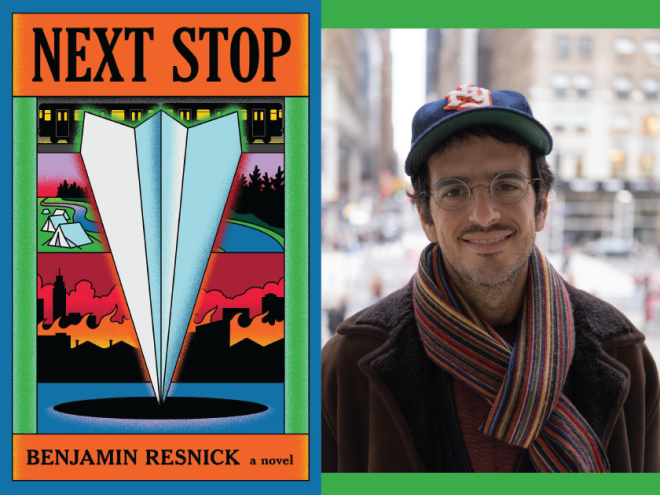For worse, better, or both, who has not imagined what the world might look like without Israel? (If you are older than seventy-six, you may not need to imagine.) Benjamin Resnick’s genre-busting debut novel, Next Stop, takes this question one step further: What would happen if, say, Israel collapsed into a black hole, triggering a global cataclysm that magnetically beckoned every Jewish person in the world? And what if the resulting antisemitic backlash triggered their destruction wholesale? Such a story might feel eerie, complicated, and uncomfortable. It might even seem hysterical. And yet it might also be familiar, as if its events, in one form or another, have already happened — or are happening right now.
The story begins a few decades into the future, when Ethan, a writer, crosses paths with Ella, a photojournalist with a young son, Michael. Ethan grew up in a secular Jewish family, while Ella’s family is observant. In this near future, the United States has splintered. Chaos reigns; antisemitism prevails. The world is literally falling apart at the seams. No, really. Israel is now “the hole in the Middle East,” and the fabric of reality is imploding in the form of “Jewholes,” or “anomalies,” which have popped up worldwide. Jews are inexplicably compelled to jump into them, disappearing into nobody-knows-quite-what. Amid mass panic, the world’s remaining Jews are collectively punished, forced into the kind of pales, ghettos, and trains that will have many readers hearing a chilly wind rustling the leaves of their family tree. Despite baseline levels of antisemitism worthy of the Third Reich, Ethan believes that “the situation would resolve itself … and things would be fine because they were always fine.”
Things do not become fine. As conditions deteriorate, the three characters are forced into a sort of provisional family that eventually turns into a real family. Conditions worsen to the point that the three must make extraordinary choices about their fates — desperate choices that are not really choices at all. Recognize any of this? Again and again, the story provokes enough questions about Jewish self-determination to make one’s head spin.
Next Stop combines heavy doses of magical realism, sci-fi, and apocalyptic mayhem. Resnick’s prose is lucid and moves at a steady clip, never dwelling anywhere too long, avoiding the kind of teeth-gnashing misery one might expect in a novel about persecution and ethnic cleansing. For all its futuristic terrors, this is really a story about a family. Even as the world melts down, Ella and Ethan bicker about parenting and groceries. And children are still being born. “It was a strange feature of life in their city,” Resnick writes, “that babies came home in cabs, on buses, on subways, as though they were people and not small gods.” These kinds of insights counterbalance Resnick’s steady political hammering. (This story appears to be set in New York, though the city is never named. For that reason, some readers may have trouble getting their bearings at times.)
Many may bristle at Resnick’s suggestion that the fate of Israel would be so explicitly connected to the entire Jewish experience. But because Resnick’s characters are contending with bewildering, fundamental struggles, Next Stop feels bigger than a political stance.
Is it even possible, Resnick seems to be asking, for Jews to be truly at home anywhere? Home in the sense of having a safe place to flourish, to build lives, families, communities? Next Stop asks more questions than it answers, and Resnick, a rabbi, captures both the joy and pain of processing our world and its intricate mysteries.
Megan Peck Shub is an Emmy-winning producer at Last Week Tonight, the HBO political satire series. Previously she produced Finding Your Roots on PBS. Her work has been published in New York Magazine, The Missouri Review, Salamander, and Vol. 1 Brooklyn, among other publications.




